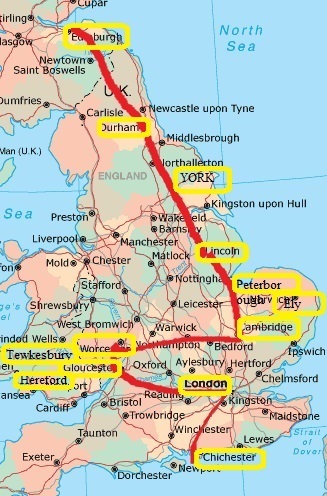U.K. 2013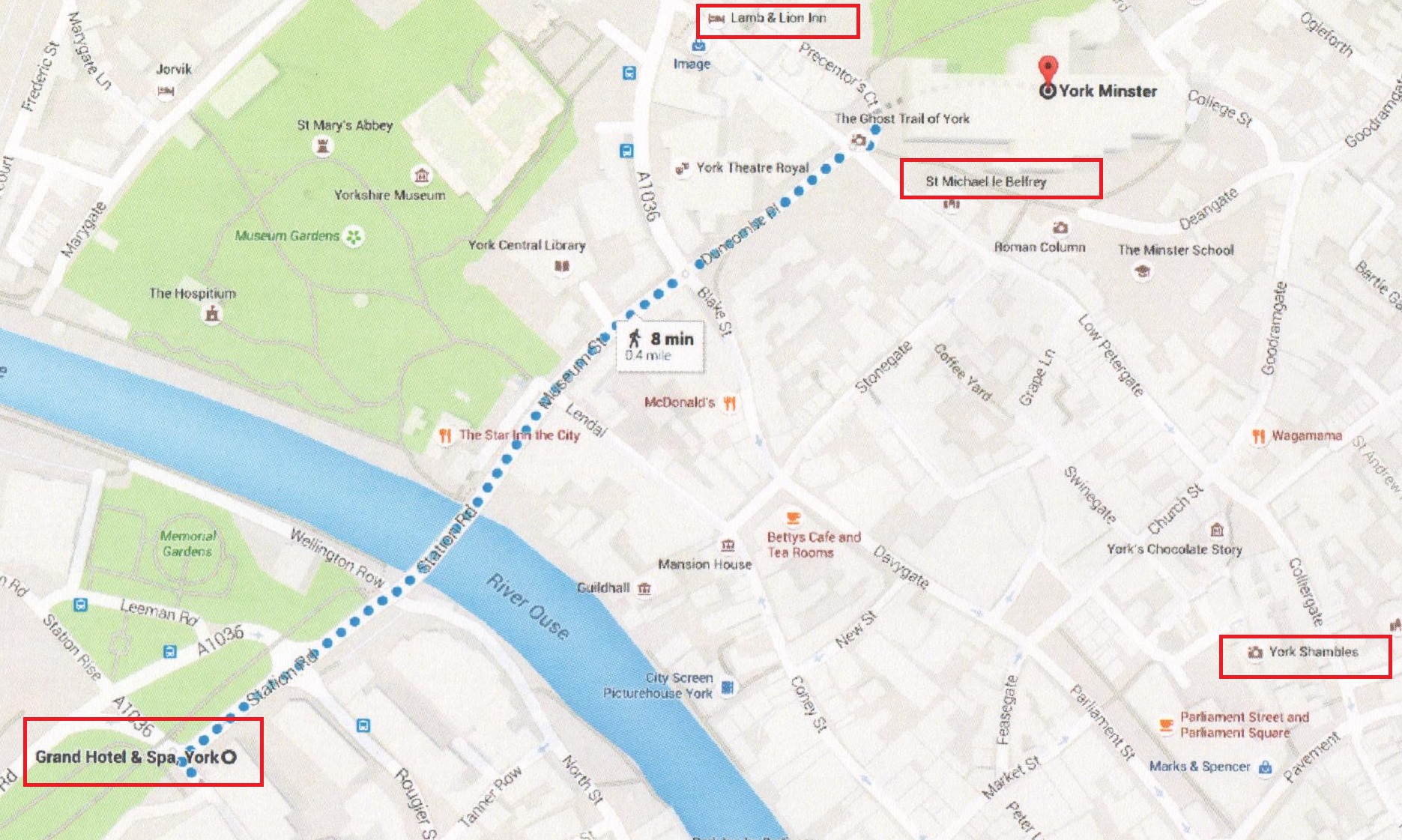
Day 9,
Wednesday, Sept. 11 York
We weren’t in a hurry to get up this morning as we had no time
schedules.
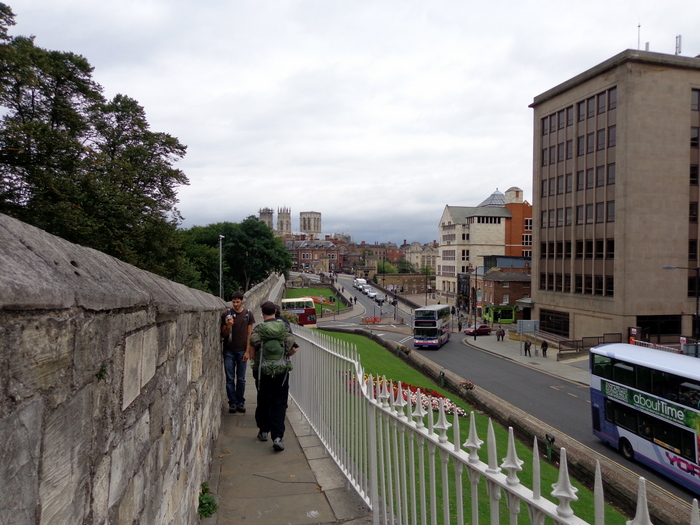 It is still cold, but we decided our first stop today
was to walk on the city wall. There is the old wall around most of the city,
and you can walk on it so we walked most of the way into town on the
wall.
It is still cold, but we decided our first stop today
was to walk on the city wall. There is the old wall around most of the city,
and you can walk on it so we walked most of the way into town on the
wall.
Our next adventure was to take a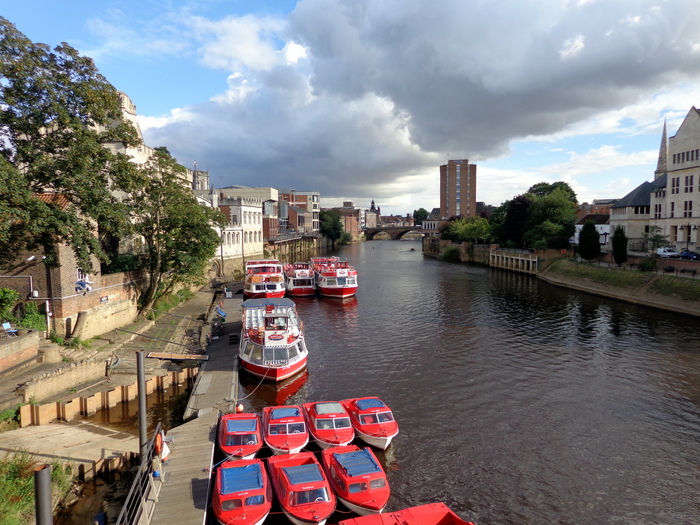 boat ride on Ouse River. We walk over
a little bridge which goes over the river every time we go into York.
It was a fairly good size tourist
boat ride on Ouse River. We walk over
a little bridge which goes over the river every time we go into York.
It was a fairly good size tourist
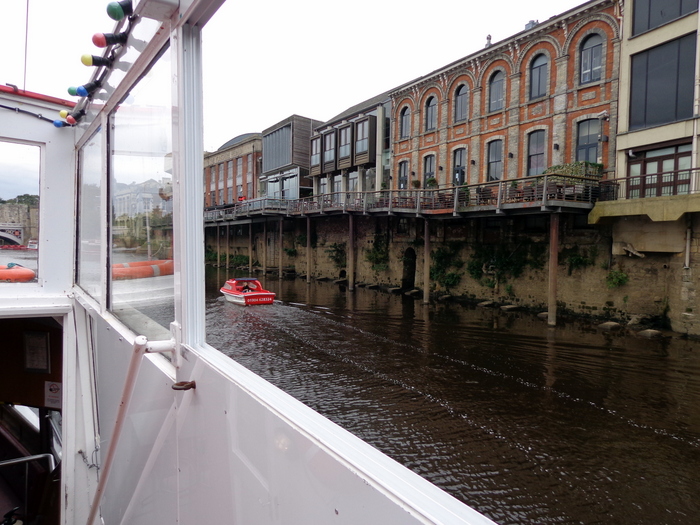 boat. There was an enclosed lower
deck and a top deck with a partial roof. We decided on the top deck.
It was a scenic ride for about 45 minutes.
boat. There was an enclosed lower
deck and a top deck with a partial roof. We decided on the top deck.
It was a scenic ride for about 45 minutes.
Next we wanted to visit a street in the old town called the Shambles. On
the way we stopped in a small Anglican Church-
St. Martins-Le-Grand. A
sign in front of the church it reads:
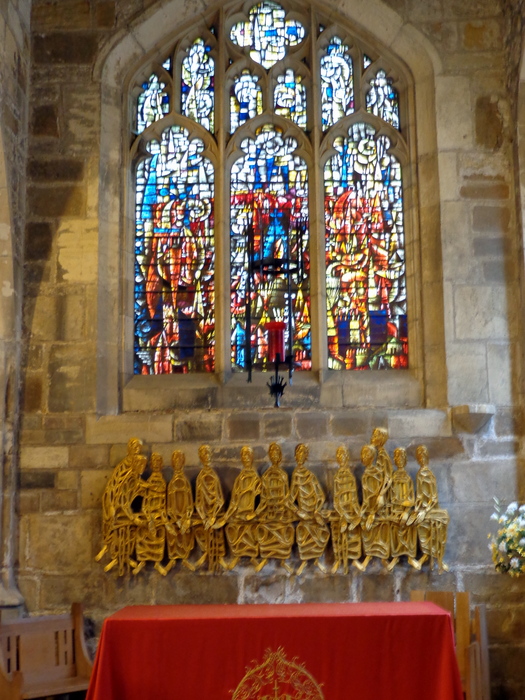 "A mainly 15th century church, pre-conquest in origin, largely
destroyed by fire in air raid 1942. The tower was completed before
1437. The great West window, considered to be one of the finest early
15th-century windows in the country was taken out at the beginning of
the 1939 – 45 war and has been reh
"A mainly 15th century church, pre-conquest in origin, largely
destroyed by fire in air raid 1942. The tower was completed before
1437. The great West window, considered to be one of the finest early
15th-century windows in the country was taken out at the beginning of
the 1939 – 45 war and has been reh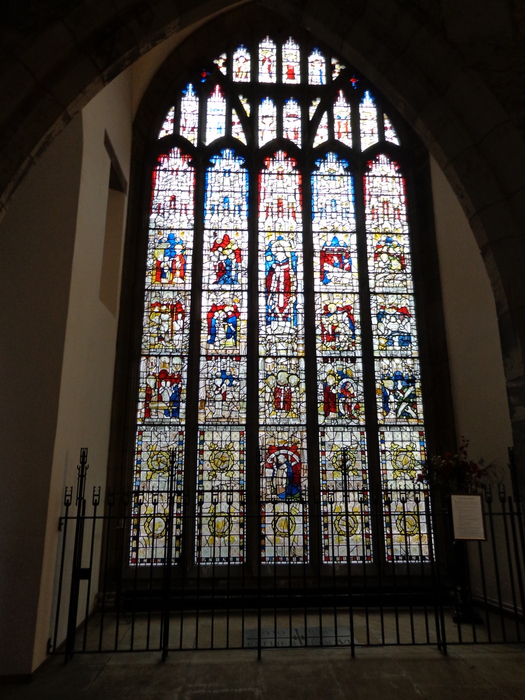 oused in the quasi– transept of the
restored to south aisle. It depicts St. Martins of Tours with 13 scenes
from his life. The remaining old glass which survived the air raid has
also been restored. The former south aisle has been restored as a
Shrine of Remembrance of the cities fallen in two wars. The distinctive
clock was first directed in his present position
oused in the quasi– transept of the
restored to south aisle. It depicts St. Martins of Tours with 13 scenes
from his life. The remaining old glass which survived the air raid has
also been restored. The former south aisle has been restored as a
Shrine of Remembrance of the cities fallen in two wars. The distinctive
clock was first directed in his present position
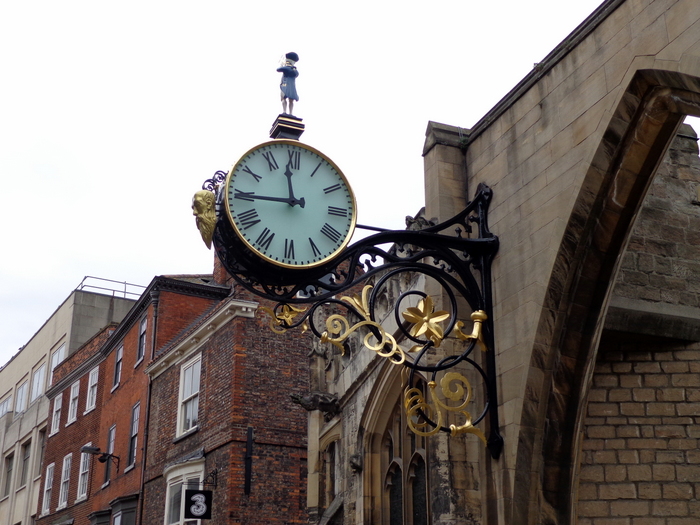 in 1668. It was
overhauled and renovated in 1754, in 1778 it was given a new dial, and a
little admiral with his sextant
in 1668. It was
overhauled and renovated in 1754, in 1778 it was given a new dial, and a
little admiral with his sextant
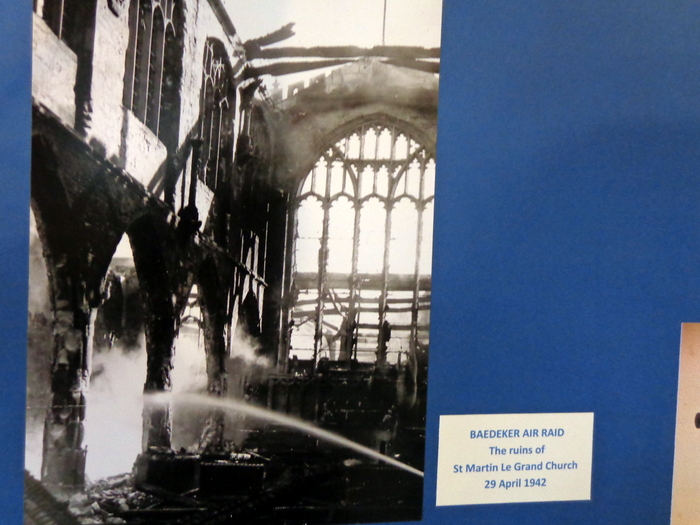 was placed upon it. The clock was badly
damaged in the raid of 1942 and was restored and returned to its own
position in 1966. The adjoining churchyard was repaved and restored in
1968 through the initiative of York Civic Trust."
was placed upon it. The clock was badly
damaged in the raid of 1942 and was restored and returned to its own
position in 1966. The adjoining churchyard was repaved and restored in
1968 through the initiative of York Civic Trust."
When we got back on the street we ran into a couple about our age…maybe a
few older… who sat next to us at breakfast. We had exchanged a few
words during breakfast. It turns out that he is a retired priest in the
Church of Scotland. He had me beat by one year on ordination- he
celebrated his 51st this year. We walked together for a while.
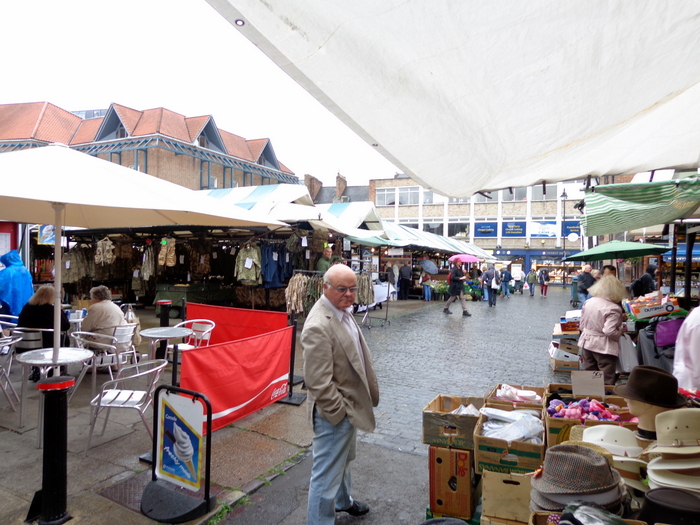 We went through an area that had a lot of outdoor tents where they had a
large market- fresh veggies, clothes, all kinds of stuff. We found the
street called The Shambles. It is a narrow street with overhanging
timber framed houses. It was where the butchers sold their meat.
We went through an area that had a lot of outdoor tents where they had a
large market- fresh veggies, clothes, all kinds of stuff. We found the
street called The Shambles. It is a narrow street with overhanging
timber framed houses. It was where the butchers sold their meat.
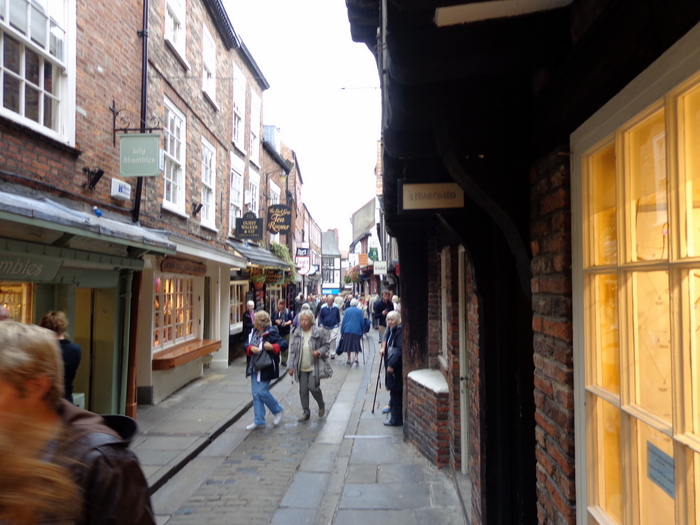 We
stopped for lunch in a little café called Little Shambles Coffee House.
I had a tuna melt and Kathleen had a grilled cheese. We sat next to a
couple from Australia. They had lived in York. We had a good
conversation.
We
stopped for lunch in a little café called Little Shambles Coffee House.
I had a tuna melt and Kathleen had a grilled cheese. We sat next to a
couple from Australia. They had lived in York. We had a good
conversation.
It was raining when we came out of the tea shop. We walked to the
cathedral which wasn’t too far away. I took more photos. I do have a
model to make, but haven’t done it yet.
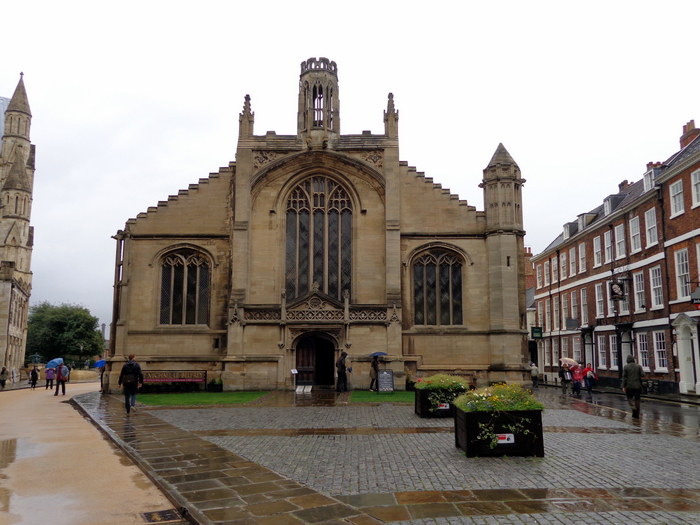 On the right side of York Minster is a another large church –
St.
Michael le Belfry. There has been a church on the site of Michael le
Belfrey Church from the 8th Century. The present building dates from the
1500's.
On the right side of York Minster is a another large church –
St.
Michael le Belfry. There has been a church on the site of Michael le
Belfrey Church from the 8th Century. The present building dates from the
1500's.
There have been Christians in York since Roman times and church buildings
in this area since at least the year 627 when Bishop Paulinus baptised
Edwin, King of Northumbria. Saxon burials discovered in Petergate are
evidence that St Michael's is of early origin.
The "le Belfrey" either refers to the next-door Minster belfry or to an
older church on this site which had a bell tower. It was controlled by
the Minster's Dean and Chapter from 1294 for several hundred years. It
is a parish church serving the local community. (The Minster is not a
parish church.) It was, and still is, the largest parish church in the
city.
serving the local community. (The Minster is not a
parish church.) It was, and still is, the largest parish church in the
city.
The building is rectangular, with a nave and two aisles. In the church
are boards bearing the names of York Lord Mayors who lived within the
parish, and information about Guy Fawkes who was baptised here in 1570.
This a replica of the earliest known bell tower, first depicted in 1705.
The west front was "restored" in 1867 after houses attached to the
church had been pulled down. The lathe and plaster ceilings, originally
painted blue, probably with gold stars, date back to 1766. John Etty
designed the large reredos with its four fluted Corinthian columns. His
son William completed it in 1712. The communion rails are contemporary
with this.
Originally the Ten Commandments appeared in the center. In 1924-1926,
the reredos was "beautified" by a copy of Zurbaran's "Adoration of the
Shepherds" to replace the Ten Commandments. The choir stalls and the
pulpit were removed from the chancel in 1973. There is now a modern
pulpit, and a lectern, and a stage area for the musicians who lead the
singing. There is large early-eighteenth century stone memorial at the
end of the south aisle - blocking out a previous window. The present
church community continues to emphasise the priority of mission.
It was still raining so we decided to come back to the hotel. Kathleen
went swimming and I caught up on my journal of photo identification.
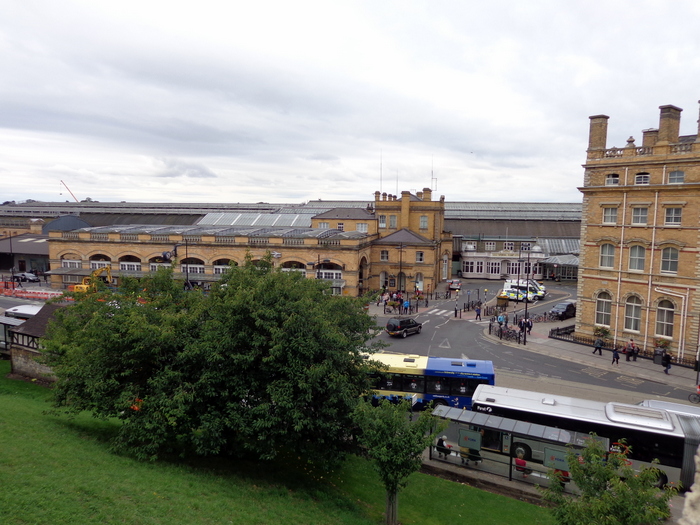 We walked to the train station to pick up our reserved ticket for
tomorrow. The lady was able to print out all of our reserved tickets.
We were able to print some of our train tickets at home, others we
reserved and paid for but had to pick them up at the train station. We
were very happy to have all our train tickets in our hands.
We walked to the train station to pick up our reserved ticket for
tomorrow. The lady was able to print out all of our reserved tickets.
We were able to print some of our train tickets at home, others we
reserved and paid for but had to pick them up at the train station. We
were very happy to have all our train tickets in our hands.
We caught a taxi to take us to the Piano Restaurant in the Churchill
Hotel. We have had reservations there since July. It was a beautiful
room with a grand piano. Tonight was the pianist night off, but they
had recorded piano music….good old favorites. We had a wonderful
dinner. Kathleen had carrot soup and I had tomatoes and goat cheese for
starters. For the main plate, Kathleen had duck and I had beef. Both
were excellent. We shared orange sorbet for dessert.
We got a taxi back to our hotel and started packing as our train leaves
at 10:00 in the morning for Lincoln. We have enjoyed our visit in York.


